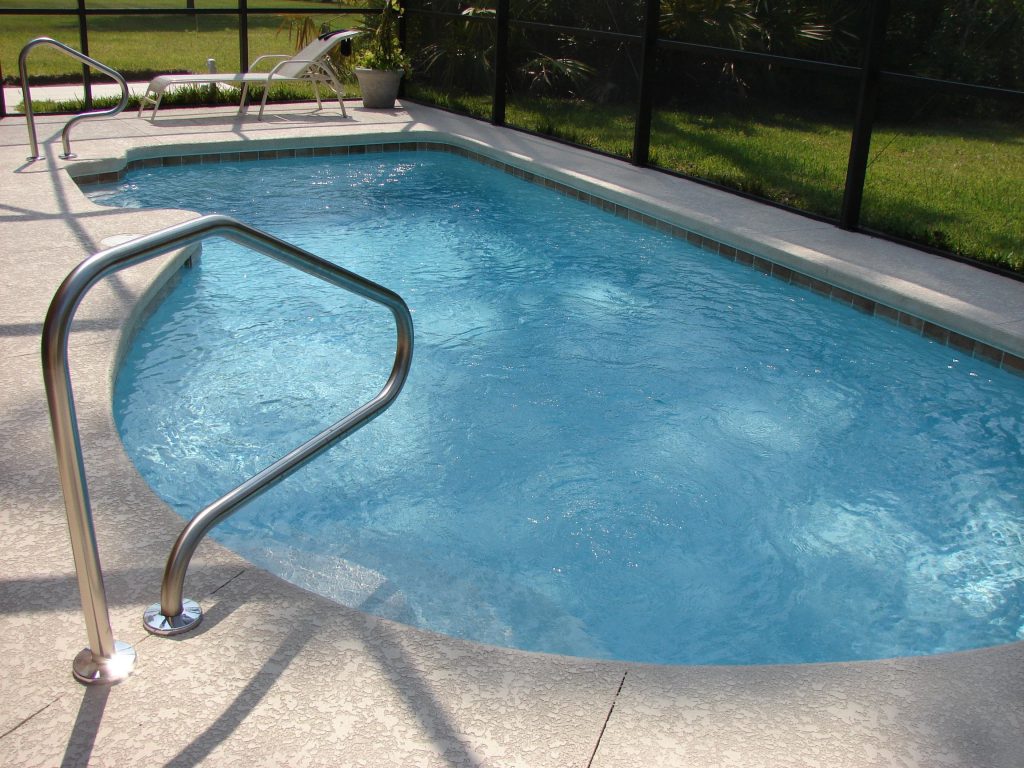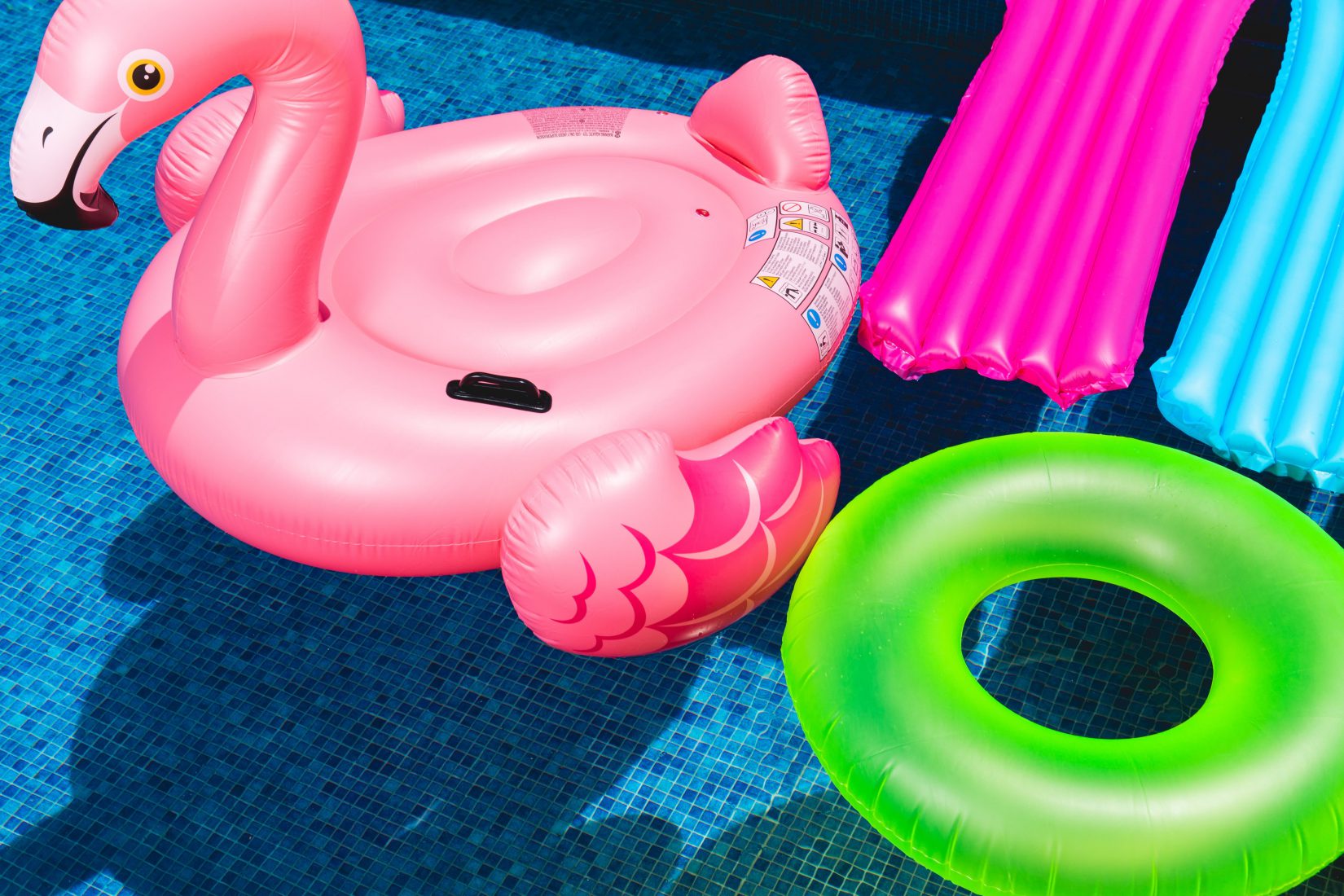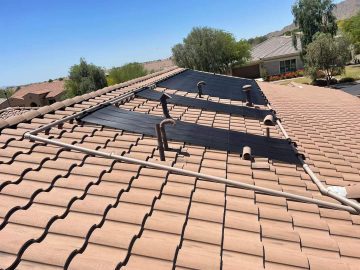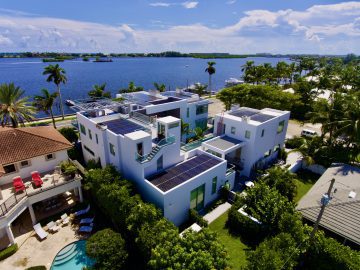We all know that summertime is the best time to take advantage of your pool, but what if you want to swim past the hot summer months? A pool heating system is your answer. But how do you choose what kind of pool heating system to use and how do you know for sure that it’s the right one?
Gas, electric and solar pool heating systems all have their pros and cons; their advantages and disadvantages. The only way to know for sure that you’re choosing the right pool heating system is to have all the facts. Here are some benefits and disadvantages of traditional pool heating systems, as well as solar pros and cons to consider.
Gas Pool Heaters
Gas pool heaters are powered by burning fossil fuels, either propane or natural gas. The heater itself has a combustion chamber, where the fuel burns. The heat it generates is what warms the pool water. It can heat your pool quickly and can be used all year round.
A gas pool heating system has its drawbacks. Not only does its required fuel add to your utility bill, but it also is only efficient if used for short periods of time. It also produces emissions since the heater burns fuel, so it isn’t eco-friendly. This means gas heating systems are only a good choice if you don’t use your pool very often. If you want to extend your swim season, you’ll want to find a more efficient option.
Gas Pros and Cons
Pros:
- Heats pool water quickly
Cons:
- Operating costs for fuel
- Not efficient
- Emissions
Electric Heat Pumps
An electric heat pump is one of the most common ways to heat your pool. Pool water flows through a heat exchanger in the heat pump where heat from the air is transferred to the water. It’s less costly compared to a gas heater that uses fossil fuels to operate. It can also be used at any time of the year.
While electric heat pumps don’t produce emissions like a gas heater does, it still isn’t the most efficient option to heat your pool. National rates for electricity are rising across the country and aren’t expected to go down. That means you can expect some added costs to your monthly utility bills if you want to extend your swim season. The colder it is outside, the more energy you’ll need to heat your pool and the more power you’ll use.
Electric Pros and Cons
Pros:
- Can be used all year round
Cons:
- Higher monthly utility bills
- Uses more energy depending on the weather
Solar Pool Heating
Solar pool heat systems rely on the sun’s radiant energy to heat your pool water. Since they’re using energy that’s already there, solar pool heating systems don’t have any extra operating costs associated with them. They’re also reliable and durable, with solar panels lasting up to 20 years or more.
So how does it work? Pool water travels through a filter, removing any debris, before moving to the solar collectors on your roof. The water starts at the bottom and moves upward, gradually warming. The heated water is then returned and the cycle begins again until your pool water is at the desired temperature.
Solar Pros and Cons
Pros:
- Inexpensive to maintain
- Long-lasting
- Environmentally friendly
Cons:
- Upfront costs of installation

How Do I Choose a Pool Heating System?
Choosing the right pool heater will depend on where you live, how often you use your pool and the size of your pool. If you want the most energy-efficient and reliable heating solution for your pool, your needs will determine what kind of system works best for you.
One thing that can help heat your pool is a pool cover. Around 75 percent of heat loss is due to evaporation, so a solar cover acts as a barrier against that. No matter what pool heating system you choose, a pool cover can help preserve your water’s temperature against surface evaporation by covering the entire area of the pool itself.
Where You Live
Where you live and what kind of climate you live in can determine what kind of pool heating system works best for you. If you live in a sunny and warm area, like in California or Florida, a solar pool heater would make the most of the weather and be the most energy-efficient option.
If you live in a colder climate, heating your pool will take more energy, especially in colder months. In this case, a gas heater would be an expensive option for you to heat your pool and extend your swim season. Take your local climate into consideration when looking for a pool heating system. It can help you determine the most energy-efficient solution.
How Often You Use Your Pool
If you only use your pool a few times a year, you may not need to worry about the added utility costs of an electric or gas pool heater. If you want to use your pool past the summer months, then you may want to consider a cost-effective heater that has low or no operating costs.
Solar pool heaters have no extra operating costs associated with them because they aren’t using fossil fuel or electricity. A solar pool heating system uses the pool pump you already have, along with solar energy, to operate. If you want to use your pool past the spring and summer seasons, then solar pool heaters may be your best option.
The Size of Your Pool
The size of your pool and how many square feet it is will determine how much energy it takes to heat it. If you have a relatively small pool, it won’t take much to heat the water to the desired temperature. A larger pool will take more time and thus more power to heat, so you’ll want to be more conscious of when you heat your pool and how often.
A gas heater would be an expensive option if you have a larger pool, especially if you live in a cooler climate. This is especially true if you want to take advantage of your pool past the regular swim season. Be sure to take that into account when calculating which system will save or cost you the most on utilities.
Keep Swimming Even After Summer Ends
Your swim season doesn’t have to end with summer. A pool heating system can keep the fun going, so you can enjoy your pool whenever you want. Choosing the right system will depend, of course, on your needs and how often you want to use your pool.
Between gas, electric and solar pool heaters, solar is generally your best option if you want to swim all year round without extra operating costs. So go ahead and dive into the world of pool heating—the water’s fine.


![4 Steps To Solar Pool Heater Installation [Infographic] 2](https://umasolar.com/wp-content/uploads/2021/07/shutterstock_80322160-scaled.jpg)
![How Solar Pool Heating Systems Work In 6 Steps [Infographic] 3](https://umasolar.com/wp-content/uploads/2021/09/child-with-father-in-swimming-pool-Arizona-2021-04-02-21-00-06-utc-scaled-1.jpg)
